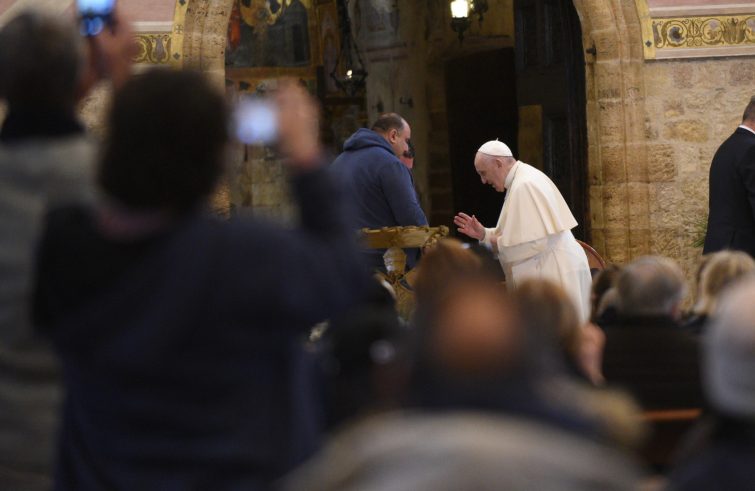
“Thank you to the poor who open their hearts to give us their wealth and heal our wounded hearts. Thank you for this courage.” These were the Pope’s concluding at the meeting with 550 poor people gathered in Assisi from all over Europe for the World Day of the Poor which will be celebrated next Sunday, November 14. With a pilgrim’s staff and mantle donated by a group of faithful, Pope Francis entered Assisi’s Basilica of St. Mary of the Angels where he listened to the testimonies of young families, volunteers, former inmates, people with diseases and refugees. The speech was followed by a moment of prayer.
“Assisi is not just like any other city”
– the Pope said in his opening remarks – Assisi bears the imprint of the face of Saint Francis”, whose “actual facts of his life that are worth more than preaching” teaches “how to be content with the little we have and to share it with others.” Assisi is not just like any other city. Here at the Portiuncula, “one of the small churches that Saint Francis thought of restoring”, he would recollect himself here in silence and put himself in an attitude of listening to God. “We too have come here for this: we want to ask the Lord to hear our cry, to hear our cry and to come to our aid”, Francis said: “Let us not forget that the first marginalisation the poor suffer from is spiritual marginalization.” Assisi is not just like any other city: “here at the Portiuncula Saint Francis welcomed Saint Clare, the first brothers, and many poor people who came to him.” It is a lesson in hospitality, that “means to open the door, the door of our house and the door of our heart, and to allow the person who knocks to come in. And that they might feel welcome, not ashamed, no, at ease, free.” “Where there is a true sense of fraternity, a sincere experience of hospitality is also lived there”, Francis said: “Instead, where there is fear of the other, contempt for their lives, then rejection is born. Hospitality generates a sense of community; rejection, on the contrary, closes in on one’s own egoism.” The Pope thus quoted from Mother Teresa, “who made hospitable service her life.” She “used to say:
‘what is the best welcome? A smile’.”
“To share a smile with someone in need does good to both people – to me and the other person”, Francis assures: “A smile as an expression of sympathy, of tenderness.”
The heart of the speech bears the hallmarks of denunciation: “The presence of the poor is often seen as an annoyance and is put up with. Sometimes we hear it said that those responsible for poverty are the poor! So as not to carry out a serious examination of conscience on one’s own actions, on the injustice of certain laws and economic measures, an examination of conscience on the hypocrisy of those who want to enrich themselves excessively, blame is laid at the feet of those who are weakest.” Instead, Francis said
“it is time that the poor be given back their voice, because for too long their requests have remained unheard. It is time that eyes be opened to see the state of inequality in which many families live. It is time for sleeves to be rolled up so dignity can be restored by creating jobs. It is time to be scandalised once again before the reality of children who are starving, reduced to slavery, tossed about in the water in the aftermath of a shipwreck, innocent victims of every sort of violence. It is time that violence against women cease and that they be respected and not treated like bargaining chips. It is time that the circle of indifference be broken so as to discover once again the beauty of encounter and dialogue. It is time to meet each other. If humanity, if we men and women do not learn to meet each other, we are heading for a very sad end.”
Courage and sincerity: the Pope thus defined the testimonies he “attentively listened to.” “First of all, I perceived a tremendous sense of hope”, the response of the Holy Father: “Life has not always treated you well; indeed, it has often shown you its cruel face. Marginalisation, suffering sickness and loneliness, the lack of so many necessary means has not stopped you from seeing with eyes filled with gratitude the little things that have enabled you to hold out.” What does it mean to hold out? “To have the strength to keep going despite everything”, the reply: “To hold out is not a passive action, on the contrary, it requires the courage to take a new path knowing it will bear fruit. To hold out means to find reasons for not giving up when confronted with difficulties, knowing that we do not experience them alone but together, and that only together can we overcome them. To hold out against every temptation to give up and fall into loneliness and sadness.” “To hold out, holding on to the little wealth we may have”, the Pope added in unwritten remarks recalling the words of the girl in Afghanistan, who said: “my body is here, my soul is there.” Or the Romanian mother, in a wheelchair, she has been in pain for eleven years. Yet “she has strong hope in her children who accompany her and repay the tenderness they received from her.”










